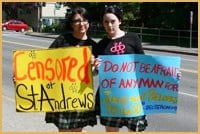Young activists in Victoria are trying to make the Island Catholic Schools safer for LGBT students.
Chloe Lutte, a recent graduate of St Andrew’s Regional Secondary School, says her personal experiences of homophobia prompted the decision to take action.
“I had this kid in my math class who was really bothering me and saying, ‘If I was you, I’d be ashamed to be queer and I would go kill myself,'” she says. “So I kind of wanted to change something.”
Lutte claims another student also told her and a friend “to go light ourselves on fire [because] we’re queers.”
She says she did not report the comments to school administration because she “didn’t trust them.”
“There had been people in the past who were queer and said the administration did nothing for them,” she alleges. “There’s many, many closeted people in my school who either want to leave the school or just keep on the down low and not be visible because they’re afraid that the administration is going to ignore them.”
St. Andrew’s principal Wilma Jamieson agreed to an interview with Xtra West but failed to appear at the designated time and could not be reached again afterwards.
According to the Catholic Independent Schools Diocese of Victoria website, superintendent Joe Colistro believes “the role [of] educators is to provide a safe environment where students are free to learn and experience their faith, enabling them to become deeply caring individuals and leaders of our community.”
But Colistro sidestepped Xtra West’s questions about St Andrew’s policies on sexual diversity, school activities, and bullying, stating only that “Island Catholic Schools is committed to the safety and well being of all students.”
The BC Independent School Act requires school curricula meet the education standards established by the provincial education minister. Though the ministry is in the process of reviewing its public school curricula for gay inclusion, independent schools are not required to address sexual orientation or gender diversity in their classrooms.
In February, Lutte and a friend tried forming a Gay-Straight Alliance. “I think [administrators] were ashamed of having the word ‘gay’ anywhere in their school,” she speculates, saying their ideas were turned down outright.
She contends that Jamieson asked for “hard proof” of the presence of homophobia at St Andrew’s to explain the need for such an organization.
Results from the first phase of Egale Canada’s National Climate Survey on Safe Schools suggest that two thirds of LGBTQ respondents feel unsafe at school.
The pair revised and resubmitted their proposal, requesting a “diversity group” instead of a GSA. “We were very clear that we were going to deal with homophobia as an issue,” says Lutte, stating that the two also planned on confronting transphobia, racism, agism, and other social justice issues within the “safe space” of the group.
“We tried to make it really open but it was never good enough for them,” she alleges.
By April, Lutte and her friends decided to change course and focus on The Day of Silence. “We wore names of victims covering our mouths,” she says. “Most of them had died due to queerbashing or something related” like the lack of compassionate medical treatment for trans patients, she explains.
Lutte alleges school authorities repeatedly tried to shut down her efforts by claiming that the campaign “slandered” the school because it implied that homophobia existed there.
On the last day of classes in June, she and a group of fellow students and allies held a picket outside of St Andrew’s. Lutte says she was protesting “the lack of response by [school] administration.”
“At first it was one person to two signs,” she says, “and then when the bell rang and more students started filing out of their classes, a lot of our allies picked up the signs and we ended up having no more signs for [people] to hold.”
Several of the signs bore messages on the theme of Christian love. One was taken from the Catechism of the Catholic Church which read: “The number of men and women who have deep-seated homosexual tendencies is not negligible… they must be accepted with respect, compassion, and sensitivity.”
The challenge of being out as queer or trans in a Catholic environment is complex. In 1986 Cardinal Ratzinger, who now leads the Church as Pope Benedict XVI, wrote that “self denial” by homosexuals, through sexual abstinence, “will save them from a way of life which constantly threatens to destroy them.”
Dignity Canada Dignité, an organization of Roman Catholics who seek reform in the Church’s sexual theology, believes a person can “certainly” be involved a same-sex relationship and still be Catholic —”not as a matter of public Church teaching but only as a matter of conscience.”
“It’s hard to convince people that you can do both at the same time,” Lutte feels, stating that she has several friends who identify as queer or trans and “are as Catholic as can be.”
Although she has now graduated, Lutte plans to keep in touch with those queer students who remain at St Andrew’s.
“You have to be open to expanding your horizons,” she recommends. “[Find] people who understand you and can help you grow, not only in your queer identity, but as a person.”

 Why you can trust Xtra
Why you can trust Xtra


